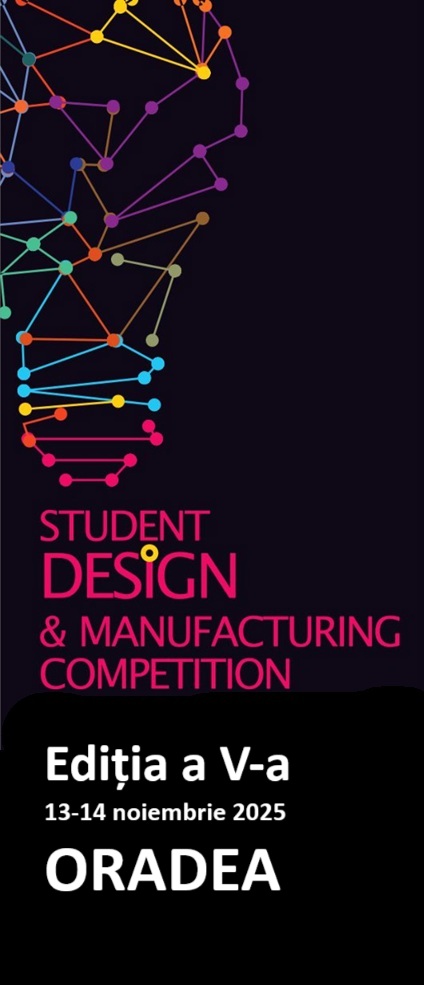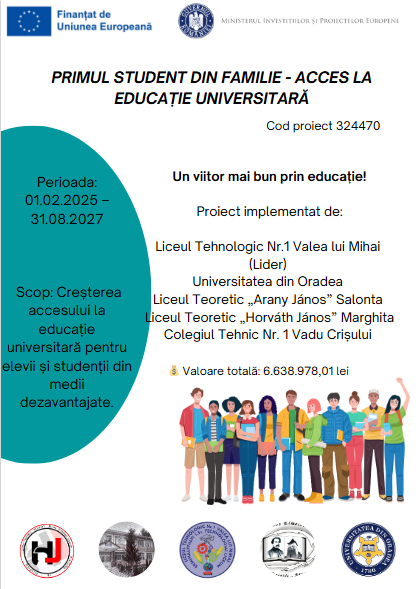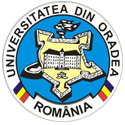 |
Locul și data desfășurării competițieiCompetiția se desfășoară la Universitatea din Oradea, Facultatea de Inginerie Managerială și Tehnologică, Centrul de Transfer Tehnologic a Universității din Oradea, conform calendarului între 13-14 noiembrie 2025. Scopul competițieiScopul concursului este promovarea creativității inginerești in rândul studenților, furnizând mediului economic noi perspective în dezvoltarea conceptuală și tehnologică a produselor. De asemenea, concursul își propune crearea, dezvoltarea și menținerea unui forum al studenților, cu scopul popularizării ideilor noi și inovatoare. Organizatorul competițieiOrganizatorul competiției „Student Design & Manufacturing Competition” - SDMC 2025, ediția a V-a este Universitatea din Oradea, prin Facultatea de Inginerie Managerială și Tehnologică și Departamentul de Inginerie Industrială. TematicăEchipele de studenți pot participa la competiție cu proiecte, modele sau machete din domeniul științei și ingineriei fabricației. Tematica competiției cuprinde:
Înscrierea la concursEchipele de studenți se pot înscrie în competiție prin depunerea la organizatorul competiției a unei scurte descrieri a proiectului. Înscrierile se pot face electronic, dacă toate materialele respectă formatul A4. Cele care depășesc acest format sau au un format nestandardizat vor fi trimise prin poștă. Materialele trimise în format tipărit vor fi trimise și în format electronic editabil. Depunerea scurtei descrieri a proiectului se va face direct la organizatorul competiției „Student Design & Manufacturing Competition”, la următoarea adresă de e-mail, respectiv următoarea adresă de corespondență (dacă este cazul).
Florin BLAGA Email: This email address is being protected from spambots. You need JavaScript enabled to view it. Str. Universității nr. 1, corpul B Oradea 410087, Bihor, România Echipele ale căror proiecte au fost selecționate de către organizatorii competiției pentru a fi prezentate în fața juriului vor fi anunțate cu cel puțin 15 zile înainte de termenul limită pentru transmiterea către organizatori a proiectelor în forma finală. |
Descrierea
- Această specializare pregătește ingineri capabili să dezvolte, proiecteze și implementeze soluții moderne pentru industria mecanică și a construcțiilor de mașini.
Durata: 4 ani
Ce înveți la TCM?
- Proiectare constructivă asistată de calculator a produselor şi sistemelor tehnice (CAD- Computer Aided Design) şi de modelare 3D a corpurilor
- Proiectarea tehnologii clasice de fabricație a pieselor: metalice, din materiale termoplastice, obţinute prin deformare plastică la rece.
- Proiectarea asistata de calculator a proceselor de fabricație (CAM- Computer Aided Manufacturing)
- Proiectare a proceselor de prelucrare specifice maşinilor unelte cu comandă numerică (CNC- Computer Numeric Control)
- Proiectarea, programarea şi urmărirea producţiei asistate de calculator (CAPS -Computer Aided Programming Scheduling )
- Ingineria asistată (Calcule inginereşti asistate de calculator (CAE - Computer Aided Engineering)
- Proiectarea de sistem expert pentru fabricaţie (MES- Manufacturing Expert System) Testarea asistată de calculator (CAT - Computer Aided Testing)
- Asigurarea calităţii asistată de calculator (CAQ -Computer Aided Quality)
Calificări ce pot fi obtinute după absolvire?
- Inginer proiectant;
- Inginer tehnolog prelucrări mecanice;
- Inginer de producție;
- Inginer programator mașini- unelte CNC (Computer Numerical Control);
- Inginer programator fabricaţie/ lansator fabricaţie;
- Inginer mecanic.
Locuri de muncă
- Companii de proiectare mașini și echipamente, Companii de proiectare linii de fabricație automatizate, Companii care produc mașini și echipament , Companii care produc linii de fabricație automatizate, Expert tehnic în sectorul publie, Consultant tehnic, Posturi în învățământul preuniversitar și universitar
- SC COMAU Romania SRL , SC GMAB SRL SC PLASTOR SA SC FAIST MEKATRONIC SC ISROM Impex SRL SC EMSIL TECHTRANS SRL SC CAP Group Romania SC ALLENGRA SRL SC GOLDE SA
Year of study I
Compulsory disciplines imposed
- Semester I
- Virtual prototyping of mechanical systems
- Modern diagnosis methods for automobile technical systems
- The expertise and the dynamic of traffic accidents
- Modern materials and technologies in the automotive industry
- Ethics and integrity in scientific research
- Professional practice I
- Semester II
- Reduction of automobile chemical and sonic pollution
- Modern solutions to improve the burning process in internal combustion engines
- The active and the passive safety of road vehicles
- The control of the power flow and of the interaction between the wheel and the road
- Professional practice II
Year of study II
Compulsory disciplines imposed
- Semester III
- Unconventional techniques for the propulsion of road vehicles
- Traffic engineering and road safety
- Service strategies and policies
- Professional practice III
- Semester IV
- Research practice for dissertation paper
- Preparation of the dissertation paper
Compulsory disciplines optional
- Semester III
Year of study I
Compulsory disciplines imposed
- Semester I
- Advanced Mechatronics
- Materials and Machine Parts for Mechatronics
- Electro-pneumo-hydraulic actuators in mechatronics
- CAD for Mechatronics
- Ethics and integrity in scientific research
- Professional practice I
- Semester II
- Machine Vision
- PLC Programming and Industrial Computers
- Robot and CNC Programming
- Project Management
- Professional practice II
Year of study II
Compulsory disciplines imposed
- Semester III
- Modelling and Simulation of Mechatronical Systems
- Advanced Manufacturing and 3D Printing
- Product Lifecycle Management
- Project: Design of a Mechatronic System
- Professional practice III
- Semester IV
- Research practice for dissertation paper
- Preparation of the dissertation paper
Compulsory optional subjects
- Semester III
- Finite Element Analysis
- Dynamic Parameters Measurements
Year of study I
Compulsory disciplines imposed
- Semester I
- Integrated machines and fabrication systems
- Modeling of surfaces and solids
- Projects management
- Durable development
- Ethics and integrity in scientific research
- Research activities / Practice I
- Semester II
- Management of knowledge and engineering creativity
- Management of innovation
- Management of marketing
- Research activities / Practice II
Compulsory disciplines optional
- Semester II
- Communication Techniques in Engineering and Management
Year of study II
Compulsory disciplines imposed
- Semester III
- Management of product life-cycle
- Advanced techniques of operational management
- Computer-aided fabrication
- Strategic management
- Research activities / Practice III
- Semester IV
- Research activity for the preparation of the dissertation
- Elaboration of the dissertation
Year of study I
Compulsory disciplines imposed
- Semester I
- Unconventional manufacturing systems and processes
- Digital design and modeling
- Durable development
- Ethics and integrity in scientific research
- Research activities / Practice I
- Semester II
- Modeling and simulation of mechanical structures
- Design of injection technologies for plastics and composites
- Reliability and maintenance
- Research activities / Practice II
Compulsory optional subjects
- Semester I
- Computer-aided design, programming and production tracking
- Semester I
- Programming numerical control manufacturing systems
Year of study II
Compulsory disciplines imposed
- Semester III
- Management of total quality
- Management of product life-cycle
- Computer-aided fabrication
- Research activities / Practice III
- Semester IV
- Research activity for the preparation of the dissertation
- Elaboration of the dissertation
Compulsory optional subjects
- Semester III
- Rapid product development
Year of study I
Compulsory disciplines imposed
- Semester I
- Mathematical analysis
- Linear algebra, analytical and differential geometry
- Descriptive geometry
- Applied informatics
- Physics
- Chemistry
- Semester II
- Technical drawing and infografic
- Computer programming and programming languages
- Materials Science and Engineering
- Mechanics I
- Materials Technology I
Compulsory disciplines optional
- Semester I
- Modern languages I (Technical English)
- Communication
- Semester II
- Modern languages II (Technical English)
Year of study II
Compulsory optional subjects
- Semester III
- Numerical methods
- Materials Technology II
- Mechanics II
- Strength of materials I
- Tolerances and dimensional control I
- Electrotechnics and Electric Machines
- Fluids mechanics
- Basics of constructive design of products
- Semester IV
- Strength of materials II
- Tolerances and dimensional control II
- Mechanisms I
- Machine parts I
- Thermo-technics and thermal equipment
- Basics of chipping and surface generation I
- Domain practice
- Experimental data processing
Compulsory disciplines optional
- Semester III
- Modern languages III (Technical English)
- Semester IV
- Modern languages IV (Technical English)
Year of study III
Compulsory disciplines imposed
- Semester V
- Mechanisms II
- Machine parts II
- Machine Parts II - Project
- Machine-tools I
- Basics of chipping and surface generation II
- Cutting tools I
- Thermal treatments
- Semester VI
- Machine-tools II
- Cutting tools II
- Cold forming technology I
- Machine construction technology I
- Specialized practice
Compulsory disciplines optional
- Semester V
- Quality engineering
- Semester VI
- Computer-aided design of products - CAD systems
- Theory of control systems
Year of study IV
Compulsory optional subjects
- Semester VII
- Cold forming technology II
- Machine construction technology II
- Machine Building Technology II - Project
- Technological devices I
- Management
- Plastic mass fabrication technology
- Semester VIII
- Technological devices II
- Technologies on machine-tools with numerical command
- Computer-aided technological design
- The practice for the diploma project
- Drawing up the Diploma Project
Compulsory disciplines optional
- Semester VII
- Marketing
- Reliability
- Semester VIII
- Nonconventional technologies
- Engineering of production systems
- Permanent joining technologies

